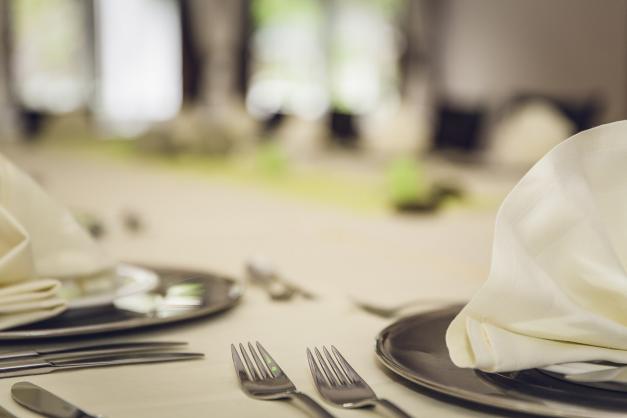
When the busy holiday season is on the horizon, get a head start by prepping your bakeware and serving items in advance. Follow these quick tips:
Spiff Up Your "Old Standbys."
Throughout the year, cooking certain types of food – like recipes with cheese, gravies, eggs or pie fillings – can leave baked-on residue or food stains on your favorite cooking/baking dishes. In addition to having "recipe residue," your non-stick cookware can also be susceptible to stains from minerals in water or excessive heat. Here are tips for getting these entertaining workhorses back in shape for the holidays:
- Soak in a solution of liquid hand dishwashing detergent and/or baking soda and water to loosen soil. (Don't use automatic dishwasher detergent product for hand washing unless recommended by the product manufacturer.)
- Scour gently with mild abrasive cleaner, baking soda or plastic mesh pad. (Avoid metal scouring pads. These could scratch the surface.)
- Make a solution from 1 quart water + 2 to 3 T of cream of tartar, lemon juice, or vinegar.
- Fill the pan with the solution, bring to a boil, and boil for 5 to 10 minutes.
- Empty the pan and scour it lightly with a steel wool soap pad.
- Make a solution from 1 quart water + ¼ c. coffee pot cleaner OR 1 quart water + 3 T oxygen bleach.
- Fill the pan with the solution, heat it to simmering, and let it simmer for 15 to 20 minutes.
- Wash the pan thoroughly, then rinse and dry.
- "Recondition" the pan with cooking oil or shortening before using again.
Survey the Silver
Sometimes, a simple re-buffing with a clean, lint-free towel is all that is needed to make your flatware shine for the occasion. Take a close look when doing your pre-holiday prep:
- Check special flatware to see if it needs to be buffed -- if so, use a clean, lint-free towel.
- If you decide to re-polish it, do it well in advance to help avoid last-minute mania. Polishing with silver polish will remove stubborn spots.
- Some silver or silver plate is not dishwasher safe. If yours looks discolored – hand wash it instead of running it through the dishwasher.
- Use silver polish to remove spots, and prevent future spots on flatware by putting stainless and silver/silverplate in separate baskets in the dishwasher to prevent them from touching during the dishwashing cycle.
- Keep stainless flatware looking spiffy all season by avoiding direct contact with dishwasher detergent. Be sure to close the lid on the detergent cup before running the dishwasher!
Check Your Glasses
If wine glasses and other special-occasion pieces are stored on open shelves (or wrapped in paper), they'll likely need to be re-cleaned to regain their sparkle. Follow these suggestions for general washing and specific conditions:
- Run them through the dishwasher, if they are dishwasher safe.
- Load them with space between each glass, to avoid potential chips.
- Use a delicate wash cycle and skip the heated drying cycle.
- When in doubt – or if they are special/irreplaceable – wash them by hand.
- Lay a towel in the sink, then fill it with hot water.
Wash one glass at a time to avoid damage, using a small amount of detergent and only where it's needed -- in the bottom of the glass and around the rim. - Cradle the bowl of the glass in one hand while washing to protect the stem. To clean the inside of a glass, use a stemware brush with soft-foam bristles.
Rinse each glass thoroughly with hot water, and immediately place it upside down to air dry, or dry the wine glasses with a smooth lint-free cloth.
- Lay a towel in the sink, then fill it with hot water.
Are you seeing spots? Spots and film on glassware can be caused by wash-water temperature that's too low, or by using too little detergent. Try these remedies:
- Increase water temperature and rinse thoroughly in hot water.
- Increase amount of detergent.
Check for film. Crystal glasses may develop a white or grey film – but it is usually removable.
- Soak glasses in a weak vinegar and water solution for one to two hours, then rinse.
- If you are soaking them in the sink, be sure to line the sink with a towel first, to help avoid chipping or breakage.